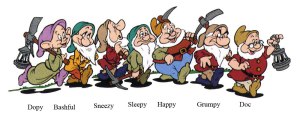- Get familiar iterating through arrays with enumerator methods like
.collector.map,.find, and.include?. - Build methods and control their return values.
- Practice control flow with
ifandelsestatements.
There are four methods to complete in this lab:
roll_call_dwarvessummon_captain_planetlong_planeteer_callsfind_the_cheese
This method should accept an array of dwarf names, for instance:
["Doc", "Dopey", "Bashful", "Grumpy"]It should then print out each name, in number order, using puts. The print-out
should look like this:
- Doc
- Dopey
- Bashful
- Grumpy
Look into the each_with_index method.
Once the test for this method is passing, move on to the next method.
This method should accept an array argument of planeteer calls that will look like this:
planeteer_calls = ["earth", "wind", "fire", "water", "heart"]It should then capitalize each element and add an exclamation point at the end. The return value of this method should be an array, in this example:
summon_captain_planet(planeteer_calls)
#=> ["Earth!", "Wind!", "Fire!", "Water!", "Heart!"]
The .map or .collect method might be appropriate for this task, take a look
at it here and here.
Once the test for this method is passing, move on to the next method, long planeteer calls.
The long_planeteer_calls method should accept an array of calls. The method
should tell us if any of the calls are longer than four characters. For example:
short_words = ["puff", "go", "two"]
long_planeteer_calls(short_words)
#=> false
assorted_words = ["two", "go", "industrious", "bop"]
long_planeteer_calls(assorted_words)
#=> trueNotice the return value of this method is either true or false, depending on
the array it was given as an argument.
Checkout the Ruby docs on arrays for a hint.
Once the test for this method is passing, move on to the last method.
The find_the_cheese method should accept an array of strings. It should then
look through these strings to find and return the first string that is a type of
cheese. The types of cheese that appear are "cheddar", "gouda", and
"camembert".
For example:
snacks = ["crackers", "gouda", "thyme"]
find_the_cheese(snacks)
#=> "gouda"
soup = ["tomato soup", "cheddar", "oyster crackers", "gouda"]
find_the_cheese(soup)
#=> "cheddar"If, sadly, a list of ingredients does not include cheese, return nil:
ingredients = ["garlic", "rosemary", "bread"]
find_the_cheese(ingredients)
#=> nilYou can assume that all strings will be lowercase. Take a look at the
.include method for a hint. This method asks you to return a string
value instead of printing it so keep that in mind.
- The
.each_with_indexmethod - The
.mapmethod - The
.includemethod
View Cartoon Collections Lab on Learn.co and start learning to code for free.


